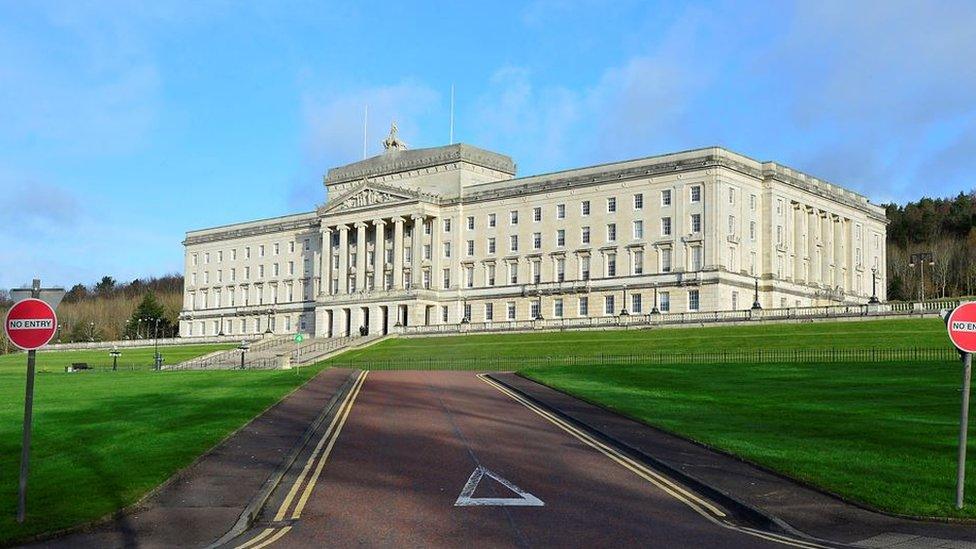Stormont budget: NI secretary denies setting out 'punishment budget'
- Published
- comments
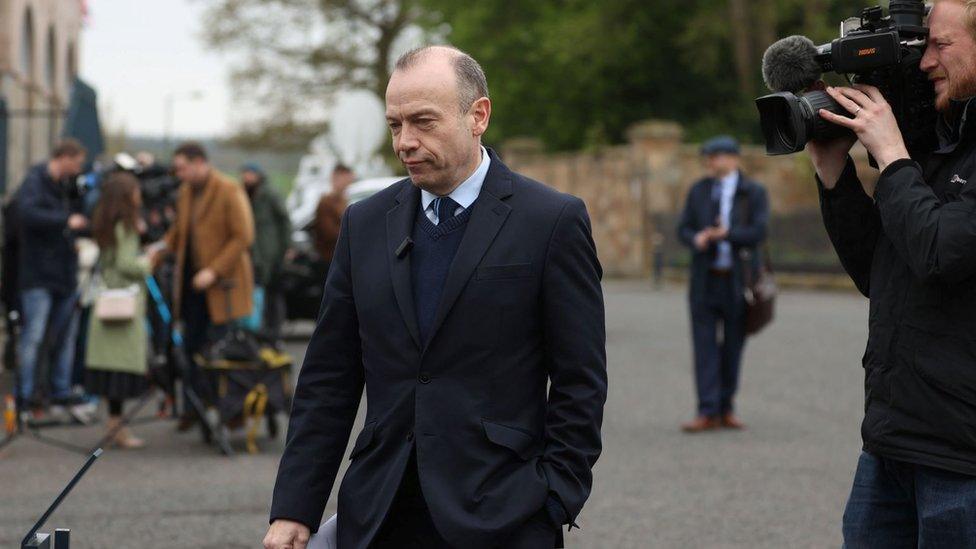
Chris Heaton-Harris spoke to the media after meeting the main Stormont parties
The secretary of state has hit back at accusations that he had set out a "punishment budget".
Earlier Chris Heaton-Harris published a Northern Ireland budget for 2023-4.
He was responding to claims from the Democratic Unionist Party (DUP) that it was "wrong for people to punish people of Northern Ireland".
The secretary of state said Stormont can repay a £300m budget overspend across two years rather than one.
Repaying the 2022-23 overspend over a longer period will "provide some protection to frontline public services", he said.
But he added departments still faced difficult decisions "in order to live within the funding available".
Stormont officials have been planning for budget cuts of at least £500m in cash terms in this financial year - most Stormont departments will have their budgets cut in cash terms.
"The purpose was not to punish anybody with this budget - it's to make sure services can continue in the absence of devolved government," said Mr Heaton-Harris.
Asked what else he could offer the DUP given that its stance on re-entering Stormont has not changed, he replied: "Let's see where talks lead to."
DUP Leader Jeffrey Donaldson said his party had "real concerns about the lack of allocations within the budget for pay awards".
"There are major challenges here and we are concerned about the way the Northern Ireland Office is handling things," he said.
"This is what the secretary of state described as a flat budget.
"Of course I want to see Stormont back up and running but it needs to be on a stable foundation."
He said going back to Stormont was not a "quick fix".
Difficult settlement
The Department of Health, the largest department, is receiving an allocation of £7.25bn for day-to-day spending - similar to the amount it got last year.
This "flat cash" funding will likely be viewed as a difficult settlement for the department, given the current high rate of inflation and outstanding pay demands.
Compared with last year's budget figures the amount of money going to Education, Justice and Economy - the biggest spending departments - has been cut slightly in cash terms.
Education will get £2.57bn, down from £2.64bn, Justice will get £1.12bn, down from £1.14bn, while Economy will get £772m, down from £780m.

Analysis: Considerable challenges remain
This budget could have been worse. But make no mistake, it is still likely to mean deteriorating public services for NI citizens.
The blow has been softened a little by allowing last year's £300m overspend to be repaid over two years instead of one.
The repayments will be drawn from any new money sent from Westminster later this year rather than being immediately chopped from departmental funds.
But that will present a significant challenge to the senior civil servants currently running Stormont.
There is an expectation that the UK government will eventually provide extra money to settle public sector pay disputes in England.
That will automatically mean extra funding for Stormont.
But that raises the prospect that the senior officials will then have to tell their workforces that they will not get a pay deal to match England because the overspend comes first.
That is not a recipe for industrial peace.
Read more from John here.

Mr Heaton-Harris said the overspend would be cleared by using any additional in-year funding from the Treasury.
Should this not cover the full amount, the outstanding balance would be paid in 2024-25 by reallocating money from previously announced Northern Ireland funding packages.
It is understood that the possibility of drawing on a funding stream known as financial transactions capital (FTC) is being considered.
This is a conditional form of capital funding which Stormont consistently underspends.
The Treasury would have to agree that FTC could be used in this way.
No new money-raising policies, such as water charges, were advanced by the Northern Ireland secretary.
He repeated that lower levels of revenue generation but higher public-service provision in Northern Ireland compared to the rest of the UK was "unsustainable".
New legislation to allow the UK government to explore options for increasing budget sustainability has also been introduced.
It will work with the Northern Ireland Civil Service to review areas for further revenue raising.
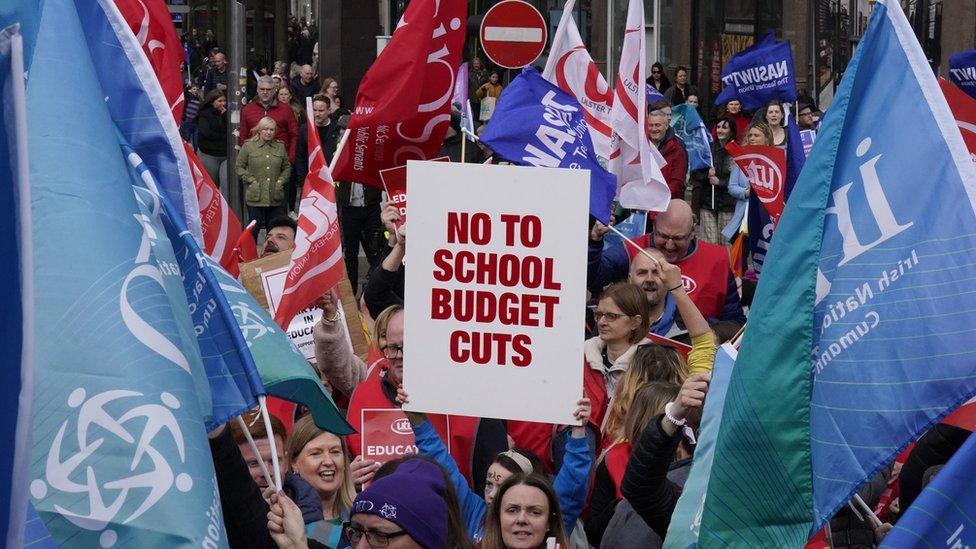
In Belfast on Wednesday people protested against budget cuts
Stormont can expect more money if the UK government allocates new funding to settle public sector pay deals in England.
But if that money must be used to reduce the overspend, it could be very difficult for senior officials to offer similar pay deals to public servants in Northern Ireland unless savings are found in other areas.
Ulster University economist Esmond Birney said the budget presented a tough challenge for the Stormont departments.
He described allowing the overspend to be paid down over two years as being the least worst option, compared to doing it immediately which "would have implied very large spending cuts in this year".
On Wednesday the head of Stormont's civil service, Jayne Brady, warned that the "damage" caused by the proposed budget reductions would be unprecedented.
Writing to Mr Heaton-Harris's office, she outlined her "profound concern" about senior civil servants being placed in "harmful decision-making positions" about which services should be cut.
It was a rare and significant intervention, and one not typically made by senior civil servants.
Retail NI Chief Executive Glyn Roberts said the budget would be "brutal for public services".
He said civil servants would be put in an "incredibly difficult position when deciding on how to apply severe cuts".
He called for a restored executive and a review of how Northern Ireland is financed.
'Punishing ordinary families'
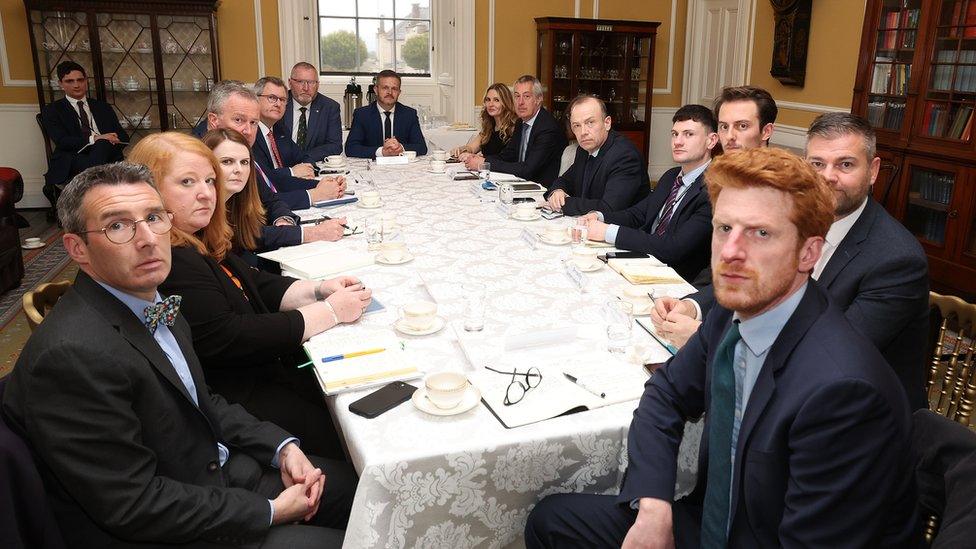
The secretary of state hosted round table talks with parties in Northern Ireland
The Stormont political parties met Mr Heaton-Harris on Thursday afternoon about the budget.
They are not in government due to the Democratic Unionist Party's (DUP) boycott of Stormont, which began in February 2022.
Sinn Féin's former Finance Minister Conor Murphy said the budget would devastate public services.
"The absence of an executive is really reprehensible at this stage when this is the outcome for people we represent," he said.
Ulster Unionist Party leader Doug Beattie said the budget did not contain "any flexibility".
"It's quite grim, if I'm really honest, but it's been put to us and it's difficult to do anything without a government up and running," he said.
Alliance Party assembly member Andrew Muir described the discussions as "grim and truly bleak".
He expressed concern that it would be left to civil servants to take decisions about cuts and said that was "entirely wrong".
Social Democratic and Labour Party assembly member Matthew O'Toole described the meeting with Mr Heaton-Harris as concerning.
He said the budget would mean "a real squeeze on public services" imposed on people in Northern Ireland that they did not deserve, ask or vote for.
Permanent secretaries - top civil servants - have been running Northern Ireland's nine departments since October but their powers are severely limited.
They can only implement policies previously agreed by politicians and their ability to react to changing circumstances is negligible.
Departments have been operating without proper budgets since the start of the financial year in April.
Related topics
- Published27 April 2023

- Published6 April 2023
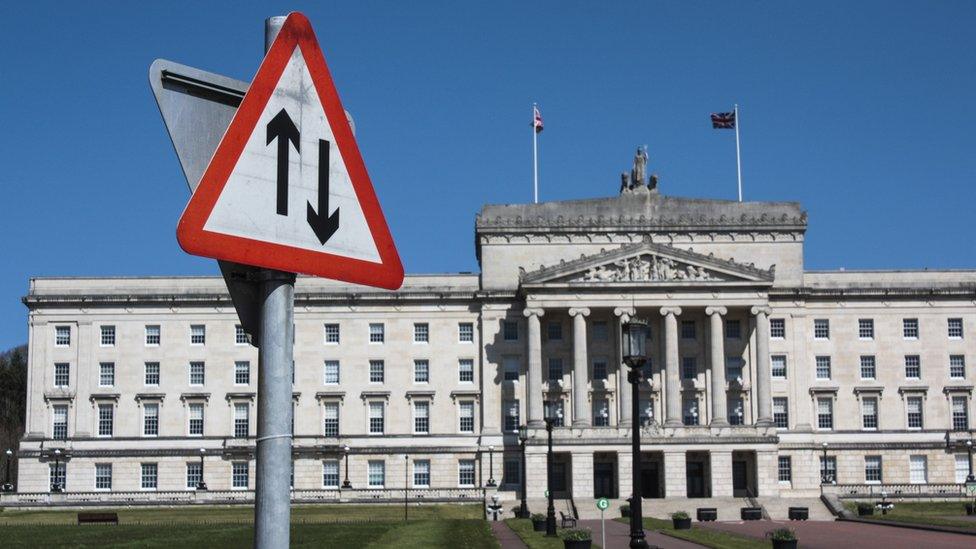
- Published1 February 2023
